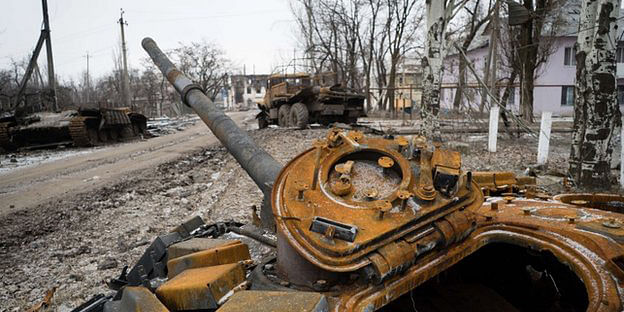Push for peace in Ukraine to resume
Push for peace in Ukraine to resume

Russian President Vladimir Putin is to discuss a peace plan for east Ukraine with the German, French and Ukrainian leaders by phone.
German Chancellor Angela Merkel and French President Francois Hollande are pushing a plan to end bloody fighting between government and rebel forces.
Meeting Putin in Moscow on Friday, they agreed to four-way talks with Ukraine's Petro Poroshenko on Sunday.
More than 5,000 people have been killed in the east since April.
Thousands more have been injured and more than a million have fled their homes.
Ukraine's military reported continued shelling on Saturday, accusing the rebels of preparing new offensives, while the rebels accused the government itself of attacking along the line dividing their forces.
Poroshenko has called on the West for support up to and including weapons.
He made the plea at a security conference in Munich on Saturday, when he brandished passports that he said were those of Russian troops in Ukraine.
Russia denies intervening directly in eastern Ukraine.
Analysis: Jonathan Marcus, BBC News, Munich
The escalating winter war in Ukraine provides a grim backdrop to the talks in Munich. Behind the scenes here there have been serious efforts to try to breathe life into the peace process.
But in public nobody was pulling any punches. US Vice-President Joe Biden made clear Washington's distrust of the Russians and its determination to "allow Ukraine to defend itself".
Could that mean giving it weapons? That's the way US thinking seems to be going, to the horror of most of its European allies. The German Chancellor Angela Merkel for one spoke out passionately against such a move.
But there's really no new peace plan in the offing, only a revamp of the old one that was never implemented - the Minsk Agreement of last year. If diplomacy fails and President Barack Obama goes ahead with arms deliveries to Ukraine, it may not only divide Nato, but provoke an even more aggressive Russian response.
'IT IS CALLED WAR'
Merkel told the conference in Munich that there was no guarantee diplomacy would succeed but it was "definitely worth trying".
The plan is thought to be an attempt to revive a failed ceasefire deal signed in Minsk, in Belarus, in September. Since then, the rebels have seized more ground, raising alarm in Kiev and among Ukraine's backers.
Hollande said it would include a demilitarised zone of 50-70km (31-44 miles) around the current front line.
The French leader has described the Franco-German plan as "one of the last chances" to end the conflict.
"If we fail to find a lasting peace agreement, we know the scenario perfectly well - it has a name, it is called war," he said.
The US is said to be considering pleas to send weapons to Ukraine.
Merkel, however, said she could not "imagine any situation in which improved equipment for the Ukrainian army leads to President Putin being so impressed that he believes he will lose militarily".
The statement put her in opposition to Nato's top military commander, US Air Force general Philip Breedlove, who told reporters that Western allies should not "preclude out of hand the possibility of the military option".
US Vice-President Joe Biden said the US would "continue to provide Ukraine with security assistance not to encourage war, but to allow Ukraine to defend itself".
"Let me be clear - we do not believe there is a military solution in Ukraine," he said. "But let me be equally clear - we do not believe Russia has the right to do what they're doing."
Ukraine's war: The human cost
• 5,358 people killed and 12,235 wounded in eastern Ukraine
• Fatalities include 298 people on board flight MH17 shot down on 17 July
• 224 civilians killed in three-week period leading up to 1 February
• 5.2 million people estimated to be living in conflict areas
• 921,640 internally displaced people within Ukraine, including 136,216 children
• 600,000 fled to neighbouring countries of whom more than 400,000 have gone to Russia
Source: Figures from UN High Commissioner for Human Rights 3 February, and UN report, 21 January
'WORTH TRYING'
Any progress may hinge on whether President Putin wants to back a peace deal now or wait for the rebels to take more ground, analysts say.
Russian Foreign Minister Sergei Lavrov, also speaking in Munich, denounced what he called "growing appeals in the West to... pump Ukraine full with lethal weapons and to involve it in Nato".
Lavrov said he believed there was "every possibility" that the latest peace plan would allow a resolution of the conflict.
Ukraine's military said on Saturday that rebels were amassing forces around the strategic town of Debaltseve and in Granitne, 35km north-east of Mariupol.
The self-proclaimed Donetsk People's Republic accused the government of having launched an offensive "all along the line of contact" in Donetsk on Friday evening.
In the rebel-held city of Donetsk, a BBC correspondent said deep booms could be heard in the distance as Ukrainian forces and rebels continued to exchange fire.